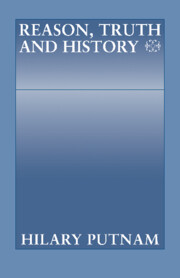Crossref Citations
This Book has been
cited by the following publications. This list is generated based on data provided by Crossref.
Díaz de Liaño del Valle, Guillermo
1970.
¿Qué es el Procesualismo Cognitivo?.
Complutum,
Vol. 28,
Issue. 1,
p.
9.
Isles, David
1981.
Constructive Mathematics.
Vol. 873,
Issue. ,
p.
111.
Kuhn, Thomas S.
1982.
Commensurability, Comparability, Communicability.
PSA: Proceedings of the Biennial Meeting of the Philosophy of Science Association,
Vol. 1982,
Issue. 2,
p.
668.
Loar, Brian
1982.
Must Beliefs be Sentences?.
PSA: Proceedings of the Biennial Meeting of the Philosophy of Science Association,
Vol. 1982,
Issue. 2,
p.
626.
McMullin, Ernan
1982.
Values in Science.
PSA: Proceedings of the Biennial Meeting of the Philosophy of Science Association,
Vol. 1982,
Issue. 2,
p.
2.
POLAKOW, AVRON
1982.
Radical defeasability and rigid designation.
Theoria,
Vol. 48,
Issue. 2,
p.
78.
Putnam, Hilary
1982.
Why reason can't be naturalized.
Synthese,
Vol. 52,
Issue. 1,
p.
3.
Hesse, Mary
1982.
Comment on Kuhn's “Commensurability, Comparability, Communicability”.
PSA: Proceedings of the Biennial Meeting of the Philosophy of Science Association,
Vol. 1982,
Issue. 2,
p.
704.
Clark, Stephen R. L.
1983.
Waking‐up: A neglected model for the afterlife.
Inquiry,
Vol. 26,
Issue. 2,
p.
209.
Coffa, Alberto
1983.
Physics, Philosophy and Psychoanalysis.
Vol. 76,
Issue. ,
p.
1.
Smith, John K.
1983.
Quantitative versus interpretive: The problem of conducting social inquiry.
New Directions for Program Evaluation,
Vol. 1983,
Issue. 19,
p.
27.
Carr, Wilfred
1983.
Can Educational Research be Scientific?.
Journal of Philosophy of Education,
Vol. 17,
Issue. 1,
p.
35.
Dokecki, Paul R.
1983.
The place of values in the world of psychology and public policy.
Peabody Journal of Education,
Vol. 60,
Issue. 3,
p.
108.
Boos, William
1983.
Limits of inquiry.
Erkenntnis,
Vol. 20,
Issue. 2,
p.
157.
Ball, Milner S.
1983.
Wrong Experiment, Wrong Result: An Appreciatively Critical Response to Schwartz.
American Bar Foundation Research Journal,
Vol. 8,
Issue. 3,
p.
565.
Spohn, Wolfgang
1983.
Methodology, Epistemology, and Philosophy of Science.
p.
371.
Smith, John K.
1984.
The Problem of Criteria for Judging Interpretive Inquiry.
Educational Evaluation and Policy Analysis,
Vol. 6,
Issue. 4,
p.
379.
Brown, James Robert
1984.
Realism and the Anthropocentrics.
PSA: Proceedings of the Biennial Meeting of the Philosophy of Science Association,
Vol. 1984,
Issue. 1,
p.
202.
Williams, Meredith
1984.
Language learning and the representational theory of mind.
Synthese,
Vol. 58,
Issue. 2,
p.
129.
Douglas, Mary
1984.
The Social Preconditions of Radical Scepticism.
The Sociological Review,
Vol. 32,
Issue. 1_suppl,
p.
68.





